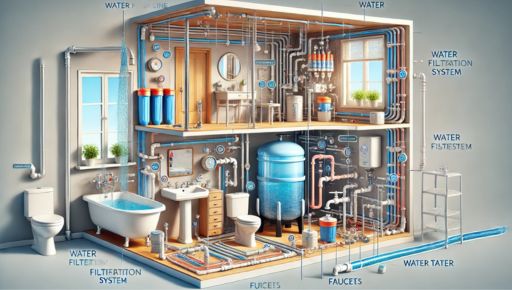
Water is one of the most essential resources in any household. From drinking and cooking to cleaning and bathing, a reliable water supply is crucial for maintaining the health, comfort, and hygiene of your home. In this article, we will explore the importance of water supply in a house, the common systems used to distribute water, potential issues that homeowners might face, and tips for maintaining an efficient and safe water supply.
Importance of a Reliable Water Supply in House
The importance of water supply in a house cannot be overstated. Water is vital for daily activities, including:
- Drinking and Cooking: Water is fundamental for preparing meals and staying hydrated. Clean, safe water is crucial for maintaining good health.
- Sanitation: Water is essential for personal hygiene and cleaning tasks, helping to prevent the spread of germs and diseases.
- Heating and Cooling: Water is used in various home appliances, including boilers, air conditioners, and water heaters, ensuring your home stays comfortable throughout the year.
- Gardening and Outdoor Use: Water is also needed for gardening, washing cars, and other outdoor tasks.
Without a consistent and clean water supply, daily life would be incredibly difficult, which is why it’s important to ensure your home’s water supply is well-maintained.
Common Types of Water Supply Systems in Homes
Most homes use one of the following common water supply systems to bring water into the house:
1. Municipal Water Supply
This is the most common water supply system for households in urban and suburban areas. A municipal water supply is provided by the local government and delivered through a network of pipes. It is typically treated to ensure that it meets safety and quality standards before it reaches your home. The system includes:
- Water Treatment Plants: These facilities ensure that the water is filtered and treated to remove contaminants like bacteria, viruses, and harmful chemicals.
- Water Distribution Network: A network of underground pipes that transports water from the treatment plant to residential homes.
With a municipal water supply, homeowners typically pay for water usage based on their consumption.
2. Well Water Supply
Homes located in rural areas or places not served by municipal water systems often rely on well water. A well water supply involves drilling a well into the ground to access groundwater, which is then pumped into the house for use. The advantages of well water include:
- Independence from Municipal Systems: Well water is a self-sustained water source, which means homeowners don’t have to rely on external systems for their water supply.
- Cost Savings: While installing a well may be expensive, the ongoing costs are often lower compared to municipal water bills.
However, well water needs to be tested regularly for contaminants, as untreated groundwater can sometimes contain harmful bacteria, chemicals, or minerals.
3. Rainwater Harvesting System
Rainwater harvesting is an eco-friendly option that some households use to supplement their water supply. In this system, rainwater is collected from rooftops and stored in tanks. The water is then filtered and used for non-potable purposes like irrigation, washing, and even bathing, depending on the level of filtration.
Potential Issues with Water Supply in House
While most homes have a reliable water supply, there are several potential issues that homeowners might face:
1. Low Water Pressure
Low water pressure can be a frustrating issue for homeowners. It can make daily tasks like showering or washing dishes time-consuming and inefficient. Low water pressure can be caused by several factors, including:
- Clogged Pipes: Over time, mineral buildup or debris in the pipes can cause blockages, reducing water flow.
- Leaks in the System: Leaking pipes or fixtures can lead to water loss, affecting the pressure throughout the house.
- Old or Faulty Plumbing: Older homes with outdated plumbing systems may experience pressure issues due to aging pipes and fittings.
To resolve low water pressure, it’s important to have a professional plumber assess the situation and determine the root cause.
2. Water Contamination
Water contamination is a serious concern that can impact your health. Contaminants can enter your water supply through various means, such as faulty pipes, agricultural runoff, or pollution in natural water sources. Common water contaminants include:
- Bacteria: Harmful bacteria such as E. coli can cause waterborne diseases.
- Heavy Metals: Contaminants like lead or mercury can leach into the water from old pipes or industrial pollution.
- Pesticides and Chemicals: In rural areas, pesticides from farms can sometimes find their way into well water.
To ensure that your water remains safe, it’s essential to regularly test your water supply and consider installing water filtration systems if necessary.
3. Clogged or Frozen Pipes
Another issue that homeowners may face is clogged or frozen pipes. In colder climates, pipes may freeze during winter, disrupting water flow and potentially causing the pipes to burst. To prevent this:
- Insulate Pipes: Insulating pipes in unheated areas like basements and attics can help prevent freezing.
- Regular Maintenance: Clear drains regularly to prevent clogging, and check pipes for leaks to avoid water wastage.
Tips for Maintaining a Reliable Water Supply in House
Taking care of your home’s water supply system is key to ensuring that it remains reliable and safe. Here are some helpful tips:
1. Install Water Filtration Systems
Even if you have a municipal water supply, installing a filtration system can improve the quality of water in your home. A water filtration system can remove chlorine, heavy metals, bacteria, and other contaminants, ensuring that the water you drink and use is clean and safe.
2. Regularly Check for Leaks
Leaky pipes can lead to water wastage and potential damage to your home. Regularly check all plumbing fixtures, including faucets, toilets, and pipes, for signs of leaks. Fixing leaks early can help conserve water and prevent larger plumbing issues.
3. Maintain the Plumbing System
Regular plumbing maintenance is essential for preventing issues such as clogs, low water pressure, and pipe damage. Hire a professional plumber to inspect your system every few years to ensure it’s functioning properly.
4. Monitor Water Usage
It’s important to be mindful of your water usage. Taking shorter showers, fixing leaky faucets, and using water-efficient appliances can help conserve water and reduce your water bill. Additionally, consider installing water-saving devices like low-flow showerheads and faucets.
5. Protect Your Pipes During Winter
If you live in an area with freezing temperatures, take steps to protect your pipes during the winter months. Insulate exposed pipes, and keep the heat on during cold spells to prevent freezing and potential pipe bursts.
Conclusion
A reliable and clean water supply is essential for maintaining a healthy and comfortable home. Whether you rely on a municipal supply, well water, or a rainwater harvesting system, it’s important to ensure that your water supply is well-maintained and safe. Regular checks, proper plumbing maintenance, and water filtration systems can go a long way in preventing issues and ensuring that your household always has access to fresh, clean water. By taking these steps, you can enjoy the convenience and benefits of a secure water supply in your house for years to come.
